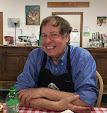Bill Sackter has been gone for more than 20 years now. He died in 1983. But his spirit lives on here at Wild Bill's Coffeeshop in Iowa City, Iowa. Look around and you can see so many memories from the days when Bill was behind the counter.
The "Bill story" began early in the 20th century in Minneapolis. Bill was the son of Russian Jewish immigrants who ran a small grocery store in a neighborhood just north of downtown Minneapolis.
By the time Bill started school it was clear his mental development was not progressing like the other children. He had the mind of someone who was about five or six. Bill later called this "cracked-mindedness."
Life was never easy for the Sackter family. But it became even harder after Bill's dad died.
Because of Bill's limited development, it was recommended that he be put into an institution. So for nearly 50 years, Bill lived at a state mental hospital in Minnesota.
Bill was released in the 1960s, one of hundreds of people who were returned to
communities around Minnesota. Bill was sent back to Minneapolis and lived in a group home.
A few years later, Bill met Barry Morrow, a college student at the University of Minnesota and community worker at Margaret Barry House, a settlement house in Minneapolis. Barry and his wife, Bev, actually lived at the settlement.
Bev worked in the restaurant at a country club, also in Minneapolis. Bill worked there, too.
Barry would come to pick up Bev from work and would see Bill in the front
window. They eventually met at a party for all of the country club employees.
A friendship blossomed and Bill became a part of Barry and Bev's family.
During this same time Barry was finishing up some classes at the University of Minnesota. One of his teachers was Tom Walz, who headed up something called the Living Learning Center.
(There are many stories about Tom Walz at Minnesota; perhaps as many as there are at the University of Iowa. Many of those stories are true. But that's a topic for another column.)
Tom Walz left Minnesota and came to the University of Iowa to head the School of Social Work. He recruited Barry to come along.
Barry and Bev came to Iowa 30 years ago; Bill followed shortly after. At some point, they all decided Bill should have a job in Iowa City.
That led to the coffeeshop inside the School of Social Work -- the one which is still here today.
It also led to a movie called, simply, "Bill." It was Barry's first movie and
eloquently tells the story of Bill Sackter's life up to the opening of the
coffeeshop. A second movie, "Bill On His Own," followed two years later in
1983. It focuses more on Bill's life in the coffeeshop. Mickey Rooney played
the part of Bill in both movies.
There is a book about Bill, too. Called "The Unlikely Celebrity," it was written by Tom Walz and published in 1999.
Bill's story has also been told as part of theater productions in Minneapolis and in Iowa City. The Minneapolis show was at the Capri Theatre; the Iowa show at Bill's coffeeshop.
Barry today lives in Santa Barbara and continues work as a screenwriter. His
best-known film is "Rainman," which is the reason for the poster of that movie
at the coffeeshop door.
Tom Walz has retired from the UI School of Social Work, but has started a new career as director of Uptown Bill's, a crosstown cousin of the original Bill's Coffeeshop. Now three years old, this venture includes not only a coffeeshop but a bookstore, an antique shop and other businesses.
Continuing in the spirit of Bill Sackter, both original Bill's and Uptown Bill's employ individuals with disabilities from the community. Both Bill's also offer volunteer opportunities for students and others interested in strengthening their "abilities awareness."
That's the "Bill story" up to now. There's sure to be a lot more to come.

